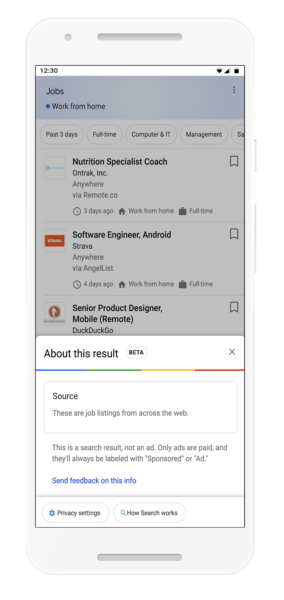Google Search launches about this result feature
Google launches a feature to help searchers learn more about the search result listing before they click on it.
Google announced it is rolling out a new feature that will communicate to searchers, before they click on the result, more information about that search result snippet they are looking at. This is a “about this result” box that can be triggered if the searcher taps on the three dots on the right top corner of the search result snippet.
What it does. The about this result feature helps searchers learn more about the search result or search feature they are interested in clicking on. It tells the searcher where the information is coming from, helping searchers understand if they can trust this site to give them the information they are seeking. Google will show if the site is secure, if Wikipedia has information on that site and if the search listing is paid for or not.
What it looks like. Here is a GIF showing you on mobile how this feature works:

Here is an example of Google showing Wikipedia information for the source. Google said this can help a searcher “if it’s a site you haven’t heard of before, that additional information can give you context or peace of mind, especially if you’re looking for something important, like health or financial information.”

If there is no Wikipedia listing for that search result, Google said the search company will “show you additional context that may be available, such as when Google first indexed the site.”
When Google shows its own features and data sources, such as Google Jobs, local business listings or other features, Google said it will display a “description about how Google sources that information from sites on the web, or from businesses themselves.”
Here is what that looks like for jobs:

Also, you will see the link to Google’s privacy settings and how search works page.
Tested but still in BETA. Google has the “BETA” label on this feature but it has been testing this for a while. We saw tests of this in October 2019 and October 2020. Google told us it has done a lot of user testing to understand if people find this feature useful. Google said it will continue to iterate this feature after it has launched based on user feedback and its tests results. If searchers have feedback, they can provide it via the link at the bottom of the panel, Google told us.
Incorrect information. What happens if the information is incorrect? Google told Search Engine Land that these descriptions are the same ones that appear on Knowledge Panels for these entities. Google does accept feedback both on Knowledge Panels and on these new results panels. Google said it “will remove descriptions in accordance with our policies for Knowledge Panels.”
If the site descriptions are not accurate, Google said they do not edit the site descriptions since they are sourced from Wikipedia. Google said it picked “to use Wikipedia data for this feature because we trust it, we know it is verified and regularly updated by hundreds and even thousands of global Wikipedia editors.”
So if your information is coming from Wikipedia and it is incorrect, you need to contact someone to fix it on the Wikipedia end.
Where will you see this. Google said it will start to roll out today, February 1, 2021, in English in the U.S. search results on mobile web, desktop and the Android Google app.
Why we care. If searchers end up using this feature a lot, which I would be surprised to see, it might become more important to make sure your brand has a Wikipedia listing, secure connection and accurate information in this “about this result” box.
Related stories
New on Search Engine Land